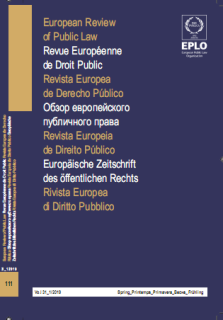
The Impact of Brexit on the EU Constitutional Nature
and on the EU Founding Treaties
Associate Professor (with Aggregation) at the Law School of Lisbon University, researcher at Lisbon Centre for Research in Public Law (CIDP) and former Justice at the Portuguese Constitutional Court. Email: aguerramartins@gmail.com
In the present report, the author analyzes the consequences of Brexit on the EU constitutional nature and on its Founding Treaties. Clarifying that her point of departure is the constitutionalism beyond the State and assuming that the EU and the EU law have a constitutional nature, the author continues discussing whether Article 50 TEU fits into this constitutional approach. She argues that, in spite of the intergovernmental essence of the provision, once triggered, the withdrawal of a Member State from the EU has a rather significant constitutional impact not only on the EU and its Founding Treaties, but also on the constitutional law of the remaining Member States. After ruling out the rhetoric of sovereignty and democracy that was one of the foundations of Brexit, the author studies the impact of Brexit on the EU territorial clause, the EU institutional framework, the EU objectives and policies, the fundamental rights and EU citizenship. Finally, the author discusses whether Brexit could become a reinforcement of the European constitutionalism, concluding that this scenario is somewhat unexpected, taking into account the raise of populist and nationalist political parties and movements, which are clearly anti-European, in many Member States.
Dans le présent article, l’auteur analyse les conséquences du Brexit sur la nature constitutionnelle de l’UE et sur ses traités fondateurs. Précisant que son point de départ est le constitutionnalisme au-delà de l’Etat et supposant que l’UE et le droit de l’UE ont un caractère constitutionnel, l’auteur poursuit la discussion sur la question de savoir si l’article 50 du TUE s’inscrit dans cette approche constitutionnelle. Elle fait valoir que, malgré l’essence intergouvernementale de la disposition, une fois qu’elle est activée, le retrait d’un Etat membre de l’UE a un impact constitutionnel assez important non seulement sur l’UE et ses traités fondateurs, mais aussi sur le droit constitutionnel des autres Etats membres. Après avoir écarté la rhétorique de la souveraineté et de la démocratie qui était l’un des fondements du Brexit, l’auteur étudie l’impact du Brexit sur la clause territoriale européenne, le cadre institutionnel européen, les objectifs et politiques de l’UE, les droits fondamentaux et la citoyenneté européenne. Enfin, l’auteur examine si le Brexit pourrait aboutir à renforcer le constitutionnalisme européen, concluant que ce scénario n’est pas vraiment attendu, compte tenu de la montée des partis et mouvements politiques populistes et nationalistes, qui sont clairement anti-européens, dans de nombreux Etats membres.
* This article is the written version of the Author’s presentation in the first session of the Annual Reunion of the European Group of Public Law in Legraina in September 2018. The Author warmly thanks the comments and suggestions of the participants in that conference. However, the opinions expressed only bind her.





















